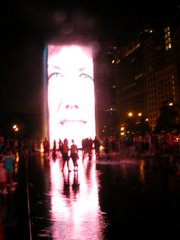Sometimes I think that those that occupy the left of our political spectrum are even tougher on border enforcement than we on the right. We are willing to try something even if it only reduces illegal immigration by 50, 60, or even 90%, whereas the left will only implement something if it stops it cold. That is the only way to explain the left's refusal to get behind the idea of a border fence.
Most have heard Democratic Governor Napolitano's response to the border fence, ""You show me a 50-foot wall and I'll show you a 51-foot ladder at the border. That's the way the border works". My response is that someone is going to look awfully suspicious walking around the Mexican desert holding onto a fifty one foot ladder. There is no full proof method to stopping illegal immigration entirely, and the governor is right. The fence will not deter someone if they are motivated enough. The reality is nothing will.
We could put together a human wall that stretches the entire border with Mexico and someone would bring a tank and run through our human wall. Nothing is full proof. That is the reality with illegal immigration and with homeland security for that matter.
While there will be those that go over and under any fence, the reality is that most will look at the fence and walk back home. That isn't good enough for the Governor or any of those on the left. I attended a debate on illegal immigration between Jim Oberweis and Susan Gzesh. Gzesh quoted the Governor in response to a question about the fence.
The reality in my opinion is the Ms. Gzesh doesn't think that the fence won't work, but that it will. Most of those that condemn the fence as flawed and "easily" penetrable, really just want open borders. What they won't say is that is that it isn't that the fence won't work, but that it will.
I am Jewish and I know something about fences. Israel has a fence on the border with the West Bank and none on the border with Gaza. Three guesses where the overwhelming majority of terrorism comes from. People like Ms. Gzesh and the Governor would have us believe that migrants would be willing to find a ladder to come here for work, but terrorists aren't willing to do the same thing in order to kill their enemy.
The arguement that we need not build a fence because people will bring a ladder is the definition of a straw man arguement. What most that are against the fence really want is an open border. The fence destroys that goal and so while they claim that the fence won't work at all, what they are really worried about is that it will.
Wednesday, June 27, 2007
Tuesday, June 26, 2007
What's Happened to Baseball
Last night, I was watching Sunday Night Baseball on ESPN between the Detroit Tigers and Atlanta Braves. The Detroit Tigers had pitching for them one Andrew Miller 6-6 210 pound left hander with mid to upper nineties fastball and wicked hook (that's curveball for all you non fans). http://sports.espn.go.com/mlb/players/profile?statsId=7847In a word, his stuff was sick.
Miller was drafted sixth last year's in the amateur draft. http://mlb.mlb.com/mlb/events/draft/y2006/index.jspThe first five were neither incompetent or asleep at the wheel. In fact, there was pretty much universal consensus that Miller was the best player available. Why then did the first five teams not draft Miller? The answer, as explained by the announcers at ESPN, was "signability". In the crudest, most appropriately demeaning terms, "signability" means that the first five teams were too damn poor to afford Miller.
Miller was signed with an upfront three and a half million dollar signing bonus and a contract behind it. Can you really blame the Devil Rays for passing on him? Their entire payroll was 30 million. By contrast, Alex Rodriguez made just over $25 million in 2006. In fact, the New York Yankees payroll ran just below $200 million in 2006.
The reason that the New York Yankees have a 200 million dollar payroll while the Devil Rays have a 30 million dollar payroll has to do with several factors. The first is obvious. New York City is metropolis with over 8 million residents, while the Tampa Bay area has about 2.4 million residents. With the introduction of cable and satellite, big market teams like the Yankees are able to take even more advantage to create more revenue streams. The YES network is a station Steinbrenner created to carry Yankees games exclusively. What are the chances that the Devil Rays would ever create their own network to host their games? The other factor is that baseball has no salary cap unlike all of the other major sports leagues. The long and short of it is that the Yankees spend 200 million per year because they can, and the Devil Rays spend 30 million per year because that is all they can.
How about this? Can anyone reading this name what round any of these players were drafted: David Ortiz, Bobby Abreu, Carlos Zambrano, Sammy Sosa, and Pedro Martinez? If you answered they weren't you would be right, and that's because the amateur draft is only for American amateurs, on other words that are playing for an American high school or college. For foreigners, it becomes a free for all. Of course any prized foreigner like Daisuke Matsuzaka invariably gets bid on by only a handful of teams. It isn't that Tampa couldn't use him, but they simply can't afford to pay him. Even in the market of foreign born players, the deck is stacked against the small market teams and in favor of the big markets.
Baseball has created a system that is rigged where only a handful of teams have any legitimate shot to win it all in any given year. Now, some may point to the Oakland Athletics and Minnesota Twins as "small market" teams that are able to thrive regardless of whatever inefficiencies I have mentioned. It is true that Billy Beane, general manager of the Athletics, has done a tremendous job, but how good would the team be without their inherent handicap?
In 2002, the Athletics had a formidable rotation anchored by studs, Barry Zito, Mark Mulder, and Tim Hudson. One by one, through trade or free agency, the A's lost each and everyone of them. It wasn't that Beane didn't want to keep them. It would have been too much to sign one individual guy and still fill other needs. The A's have a very strong farm system that produces young talent like Rich Harden consistently. Thus, they could afford to lose the nucleus. The simple fact of the matter is that if the A's weren't hamstrung their rotation would just be lethal, and these three guys would be followed by Harden. The A's would be winning World Series not just making the playoffs.
Then there is the issue of steroids. Barry Bonds is now only six home runs away from tying the most hollowed record in sports. The evidence against him is so plentiful and overwhelming that it is now to the point of overkill. Only die hard Giant fans continue to believe that he didn't take steroids. Soon we will all hold our collective noses while the universally loathed Bonds becomes the new home run champ.
How did we get here? It all started in 1994. You all remember that baseball year. What a great World Series that was? It was full of drama and excitement. If by drama and excitement you mean a blank screen because they didn't have a World Series that year because there was a strike. As one of my friends said back then, "a bunch of millionaires and billionaires can't seem to figure out how to divvy up the money". In the aftermath of the strike, the fans revolted. What brought them back? It was the home run chase of 1998. Today, most of us are convinced that the Home Run chase was a fraud and the participants cheaters.
Baseball either knew and did nothing or simply looked the other way, and either way, it isn't good for baseball. Steroids run so deep that no one knows just how many players were involved, but we all know that it was lots. A couple years ago I was watching another Tigers game when Ivan Rodriguez came up to bat. The announcers began a long analysis of why his home runs were down in the last couple years: he moved to Comerica Park which is spacious, he moved into the second spot in the office, he was getting older. It was like the announcers were dancing around the issue. All of those were probably contributing factors, however Rodriguez showed up to spring training in 2005, the first year they tested, with about thirty pounds less of muscle. Now, I am not saying he used steroids, but I am saying that all that muscle he lost had something to do with all the less home runs he hit.
The union of course has their dirty hands in both of these matters. For years, the union was able to fight of drug testing on right to privacy issues. They were also able to fight off the salary cap that has contributed to the mess that is the current salary structure. Other forces have also played a role like free agency, and agents who have set a market that only some of the teams can reach. Everyone already knows about Scott Boras and Alex Rodriguez' contract http://www.usatoday.com/sports/columnist/oconnor/2003-12-27-oconnor-losers_x.htm
http://espn.go.com/mlb/news/2000/1210/937273.html
That said, the role of the ridiculously strong union cannot be downplayed in this whole mess.
The national pastime allowed a strike to nearly bring it down, and then most likely allowed cheaters to bring it back into the spotlight. Now, it has a policy that provides an unfair advantage to big market teams while turning most small market teams into sacrificial lambs.
Finally, during the game I took a poll of what everyone thought of the designated hitter. http://en.wikipedia.org/wiki/Designated_hitterWe were unanimous on two aspects: one we didn't like it and two, we didn't dislike it enough to get upset. Well, maybe if we weren't dealing with cheaters and an unfair playing field then maybe we would care some more that baseball allows people to play only parts of the game.
Miller was drafted sixth last year's in the amateur draft. http://mlb.mlb.com/mlb/events/draft/y2006/index.jspThe first five were neither incompetent or asleep at the wheel. In fact, there was pretty much universal consensus that Miller was the best player available. Why then did the first five teams not draft Miller? The answer, as explained by the announcers at ESPN, was "signability". In the crudest, most appropriately demeaning terms, "signability" means that the first five teams were too damn poor to afford Miller.
Miller was signed with an upfront three and a half million dollar signing bonus and a contract behind it. Can you really blame the Devil Rays for passing on him? Their entire payroll was 30 million. By contrast, Alex Rodriguez made just over $25 million in 2006. In fact, the New York Yankees payroll ran just below $200 million in 2006.
The reason that the New York Yankees have a 200 million dollar payroll while the Devil Rays have a 30 million dollar payroll has to do with several factors. The first is obvious. New York City is metropolis with over 8 million residents, while the Tampa Bay area has about 2.4 million residents. With the introduction of cable and satellite, big market teams like the Yankees are able to take even more advantage to create more revenue streams. The YES network is a station Steinbrenner created to carry Yankees games exclusively. What are the chances that the Devil Rays would ever create their own network to host their games? The other factor is that baseball has no salary cap unlike all of the other major sports leagues. The long and short of it is that the Yankees spend 200 million per year because they can, and the Devil Rays spend 30 million per year because that is all they can.
How about this? Can anyone reading this name what round any of these players were drafted: David Ortiz, Bobby Abreu, Carlos Zambrano, Sammy Sosa, and Pedro Martinez? If you answered they weren't you would be right, and that's because the amateur draft is only for American amateurs, on other words that are playing for an American high school or college. For foreigners, it becomes a free for all. Of course any prized foreigner like Daisuke Matsuzaka invariably gets bid on by only a handful of teams. It isn't that Tampa couldn't use him, but they simply can't afford to pay him. Even in the market of foreign born players, the deck is stacked against the small market teams and in favor of the big markets.
Baseball has created a system that is rigged where only a handful of teams have any legitimate shot to win it all in any given year. Now, some may point to the Oakland Athletics and Minnesota Twins as "small market" teams that are able to thrive regardless of whatever inefficiencies I have mentioned. It is true that Billy Beane, general manager of the Athletics, has done a tremendous job, but how good would the team be without their inherent handicap?
In 2002, the Athletics had a formidable rotation anchored by studs, Barry Zito, Mark Mulder, and Tim Hudson. One by one, through trade or free agency, the A's lost each and everyone of them. It wasn't that Beane didn't want to keep them. It would have been too much to sign one individual guy and still fill other needs. The A's have a very strong farm system that produces young talent like Rich Harden consistently. Thus, they could afford to lose the nucleus. The simple fact of the matter is that if the A's weren't hamstrung their rotation would just be lethal, and these three guys would be followed by Harden. The A's would be winning World Series not just making the playoffs.
Then there is the issue of steroids. Barry Bonds is now only six home runs away from tying the most hollowed record in sports. The evidence against him is so plentiful and overwhelming that it is now to the point of overkill. Only die hard Giant fans continue to believe that he didn't take steroids. Soon we will all hold our collective noses while the universally loathed Bonds becomes the new home run champ.
How did we get here? It all started in 1994. You all remember that baseball year. What a great World Series that was? It was full of drama and excitement. If by drama and excitement you mean a blank screen because they didn't have a World Series that year because there was a strike. As one of my friends said back then, "a bunch of millionaires and billionaires can't seem to figure out how to divvy up the money". In the aftermath of the strike, the fans revolted. What brought them back? It was the home run chase of 1998. Today, most of us are convinced that the Home Run chase was a fraud and the participants cheaters.
Baseball either knew and did nothing or simply looked the other way, and either way, it isn't good for baseball. Steroids run so deep that no one knows just how many players were involved, but we all know that it was lots. A couple years ago I was watching another Tigers game when Ivan Rodriguez came up to bat. The announcers began a long analysis of why his home runs were down in the last couple years: he moved to Comerica Park which is spacious, he moved into the second spot in the office, he was getting older. It was like the announcers were dancing around the issue. All of those were probably contributing factors, however Rodriguez showed up to spring training in 2005, the first year they tested, with about thirty pounds less of muscle. Now, I am not saying he used steroids, but I am saying that all that muscle he lost had something to do with all the less home runs he hit.
The union of course has their dirty hands in both of these matters. For years, the union was able to fight of drug testing on right to privacy issues. They were also able to fight off the salary cap that has contributed to the mess that is the current salary structure. Other forces have also played a role like free agency, and agents who have set a market that only some of the teams can reach. Everyone already knows about Scott Boras and Alex Rodriguez' contract http://www.usatoday.com/sports/columnist/oconnor/2003-12-27-oconnor-losers_x.htm
http://espn.go.com/mlb/news/2000/1210/937273.html
That said, the role of the ridiculously strong union cannot be downplayed in this whole mess.
The national pastime allowed a strike to nearly bring it down, and then most likely allowed cheaters to bring it back into the spotlight. Now, it has a policy that provides an unfair advantage to big market teams while turning most small market teams into sacrificial lambs.
Finally, during the game I took a poll of what everyone thought of the designated hitter. http://en.wikipedia.org/wiki/Designated_hitterWe were unanimous on two aspects: one we didn't like it and two, we didn't dislike it enough to get upset. Well, maybe if we weren't dealing with cheaters and an unfair playing field then maybe we would care some more that baseball allows people to play only parts of the game.
Wednesday, June 20, 2007
From Oil to Energy
For the last few months, I have gone on a search for as much information as I could to figure why, if everyone wants it, we as a nation can't seem to find anything near energy independence. We all know that everytime we fill up our cars we fund the very enemies that wound up hitting us on 9/11, and yet as a nation we can't seem to rid ourselves of our "oil addiction". The answer begins with one word, oligopoly http://en.wikipedia.org/wiki/Oligopoly (more on this later)
In order for our nation to achieve energy independence the major oil companies must transform themselves into energy companies. Next to regular, super, and diesel, your local gas station would also need to have natural gas, ethanol, hydrogen, and all sorts of other fuel sources we don't even know about yet. Anyone who has seen a BP Amoco commercial knows that is exactly what they are trying to sell the public on, but anyone who studies the facts also knows this is pure rubbish.
In 2006, BP Amoco made about 22 billion dollars in pure profit, after every expense including taxes. What does there commercial say they will spend on alternative fuels...about 700 million dollars over the next ten years. Comparing those two numbers, the amount that BP will spend on alternative fuels is a drop in the bucket. It is done purely for the sake of public relations. The company walks away with 20 billion and we are suppposed to be impressed because they spent 70 million this year. This way while we continue to spend obscene amounts on petroleum at their stations, we will also be led to believe that they are serious in producing alternative fuels. They aren't. They could spend ten or a hundred times on alternative fuels and still have plenty left over. They could but then they would be serious about producing alternative fuels. It would be something more than a slogan to increase their brand.
That said, is there anyone reading this that blames anyone at BP for doing anything different. If you were making money hand over fist in petroleum, why in the world would you do anything to shake things up. Why reinvent the wheel when the wheel is well so profitable.
The problem lies in this word, oligopoly. There is very little difference from the big oil companies of 2007 and Standard Oil of the early nineteen hundreds. We broke up standard oil and produced a handful of companies that act pretty much exactly the way standard oil did on its own.
Some may question why in a market such things could go on. That's because petroleum is no market. When we have six companies, what happens is a quick game of chicken. One company sets the price and then the rest follow. All of them get fat, very fat, and we the consumer get hosed. Worse yet, our addiction to oil continues, because that is what is making them fat. None of them have any motivation to change because as it stands now there is plenty of money for all of them, as long oil is the only game in town. Does PB really have any motivation for introducing a natural gas tank next to their petroleum tank? For what. Someone might actually like it and ask for more tanks and then their whole windfall profits may even get threatened.
The system is rigged and I don't know if there is anything we can do about it. I don't know enough about anti trust to know if it is even possible to break them up, which in my estimation, is the only way to create the kind of competition necessary to transform oil companies into energy companies. I certainly know there is absolutely no will even if there is legal standing. The oil companies will continue to get fat while preaching to us about change. We will continue to get hosed, and the Saudis they will continue to profit and send that money to madrassas all over the world so that new UBL's can be created. As for me, I will continue to see the hair on the back of my neck stand up everytime I see BP claiming to be transforming itself.
In order for our nation to achieve energy independence the major oil companies must transform themselves into energy companies. Next to regular, super, and diesel, your local gas station would also need to have natural gas, ethanol, hydrogen, and all sorts of other fuel sources we don't even know about yet. Anyone who has seen a BP Amoco commercial knows that is exactly what they are trying to sell the public on, but anyone who studies the facts also knows this is pure rubbish.
In 2006, BP Amoco made about 22 billion dollars in pure profit, after every expense including taxes. What does there commercial say they will spend on alternative fuels...about 700 million dollars over the next ten years. Comparing those two numbers, the amount that BP will spend on alternative fuels is a drop in the bucket. It is done purely for the sake of public relations. The company walks away with 20 billion and we are suppposed to be impressed because they spent 70 million this year. This way while we continue to spend obscene amounts on petroleum at their stations, we will also be led to believe that they are serious in producing alternative fuels. They aren't. They could spend ten or a hundred times on alternative fuels and still have plenty left over. They could but then they would be serious about producing alternative fuels. It would be something more than a slogan to increase their brand.
That said, is there anyone reading this that blames anyone at BP for doing anything different. If you were making money hand over fist in petroleum, why in the world would you do anything to shake things up. Why reinvent the wheel when the wheel is well so profitable.
The problem lies in this word, oligopoly. There is very little difference from the big oil companies of 2007 and Standard Oil of the early nineteen hundreds. We broke up standard oil and produced a handful of companies that act pretty much exactly the way standard oil did on its own.
Some may question why in a market such things could go on. That's because petroleum is no market. When we have six companies, what happens is a quick game of chicken. One company sets the price and then the rest follow. All of them get fat, very fat, and we the consumer get hosed. Worse yet, our addiction to oil continues, because that is what is making them fat. None of them have any motivation to change because as it stands now there is plenty of money for all of them, as long oil is the only game in town. Does PB really have any motivation for introducing a natural gas tank next to their petroleum tank? For what. Someone might actually like it and ask for more tanks and then their whole windfall profits may even get threatened.
The system is rigged and I don't know if there is anything we can do about it. I don't know enough about anti trust to know if it is even possible to break them up, which in my estimation, is the only way to create the kind of competition necessary to transform oil companies into energy companies. I certainly know there is absolutely no will even if there is legal standing. The oil companies will continue to get fat while preaching to us about change. We will continue to get hosed, and the Saudis they will continue to profit and send that money to madrassas all over the world so that new UBL's can be created. As for me, I will continue to see the hair on the back of my neck stand up everytime I see BP claiming to be transforming itself.
Monday, June 18, 2007
Subscribe to:
Posts (Atom)













